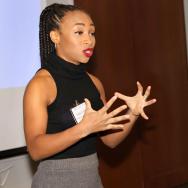Tight circles and closed ranks have long kept diverse businesses sidelined from contract opportunities with large corporations, nonprofits and universities. A common refrain from decision-makers often was: “We can’t find any women or minorities to consider for this project.”
To address the issue, the University of Chicago founded the Professional Services Symposium 15 years ago to connect diverse talent across the city with officials at UChicago. Led by the University’s Office of Business Diversity, the annual symposium has helped more than 100 minority- and women-owned firms win project contracts with UChicago and earn over $200 million across the spectrum of professional services. The symposium also inspired the first Business Diversity Institute event this year at UChicago.
This year’s symposium, held in November, provided 30 minority- and woman-owned suppliers with opportunities to meet with leadership at UChicago, the Medical Center, and the Obama Foundation through scheduled appointments on campus, as well as a reception and fireside chat.
Nadia Quarles, assistant vice president in the Office of Business Diversity, said this year’s symposium included firms representing legal, money management, communications, information technology, human resources, architecture and engineering industries. It reflected the breadth of opportunities at the symposium for both business and officials.
“This symposium was created 15 years ago because of the lack of exposure the University had to the enormous amount of minority- and women-owned business talent in these high-margin industries. People are used to working with who’ve they have known for a very long time. Oftentimes, those long-standing relationships aren’t with minority-owned businesses,” said Quarles, who has led the symposium since its inception. “Over the years, the symposium has broken down those barriers, and the relationships that result are mutually beneficial. We get the best talent in the marketplace while helping minority- and women-owned business enterprises grow to scale.”
In a video message at this year’s event, President Paul Alivisatos talked about UChicago’s commitment to business diversity.
“This event is just one great example of the results that can be achieved when we collaborate closely with minority- and women-owned businesses,” Alivisatos said. “This symposium is not just a singular event but rather the most visible facet of our enduring dedication to business diversity. It shapes how we conduct business and cultivate relationships with our partners throughout the year. The spirit we bring to our efforts extends further. Even when we engage with majority-owned businesses, we encourage them to embrace diversity by utilizing diverse teams on University projects.”
Closing the country’s “disparity gaps”
During the symposium, Quarles led a conversation with Martin Cabrera Jr., founder and CEO of Cabrera Capital Markets and Cabrera Capital Partners; and John Palfrey, president of The John D. and Catherine T. MacArthur Foundation. In a wide-ranging discussion, the two executives offered their insights on being a diverse business and being the leader of a grant-making body that also procures diverse services, respectively.
Cabrera shared challenges and successes leading to his Latino-owned firms achieving billions in investments since its founding. He discussed how opportunities for diverse businesses are sometimes purposely thwarted and how talented, diverse businesses deserve more representation in areas such as professional services.
“We have to be unapologetic about creating wealth. That’s what we need in our country, to really close the disparity gaps in our country and giving those opportunities—whether it’s in private equity or real estate or institutional money management; that’s what’s really key,” Cabrera said. “When you have some of those minority firms competing at those levels, that’s when you see the true wealth creation.”
Cabrera cited Robert Smith, founder and CEO of the investment firm Vista Equity Partners, as an example. “He’s done extremely well, one of the best private equity firms in the country—actually in the world. He just happens to be black,” he said. “So there are examples out there. Firms just need to be given the opportunity.”
Palfrey discussed demographic shifts in the United States and how racial minorities are now becoming the majority. “It’s true today in Chicago that we are majority-minority, in the sense that 31 percent is Latino, 29 percent is black and 7 percent is Asian,” he said. “We’re already there in Chicago. This is not 2060. We’re leaving a huge amount of talent on the table if we’re not hiring and contracting that way.”
Also during her conversation, Quarles presented the John W. Rogers Jr. Business Diversity Impact Award to Courtney Davis Curtis, assistant vice president for risk management and resilience planning. The annual award recognizes a UChicago leader who has demonstrated a commitment to hiring minority- and women-owned professional services firms.
“It was a real opportunity”
Participants in the symposium said having the undivided attention of leaders in charge of upcoming projects and contracts is game-changing for businesses.
In her meeting, Nicole Johnson-Scales, CEO of NJS Consulting Group, presented her team’s capabilities in the area of human resources, including executive training and coaching. She also asked about future possibilities of being tapped to work with UChicago leaders.
“As an entrepreneur, you're always looking for opportunities to grow your business,” Johnson-Scales said. “To have the opportunity to present to key decision-makers through this forum is both extremely unique and valuable.”
The event made a positive impression on Chris Melvin, managing member at Chicago River Capital. He had an audience with leaders looking to work with money management firms. The meeting was so fluid that Melvin’s team had to deviate from their planned approach, which he said was a welcome change.
“They brought all the decision-makers into a room, and they focused on us,” Melvin said. “We didn’t adhere to the presentation because we were busy answering questions because they were truly engaged,” he said. “I felt like it was a real opportunity. I felt that it wasn’t check-the-box.”

